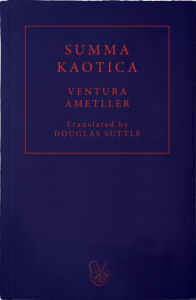This month in newly released translations, we’re featuring two authors of inimitable voice and style. From the Catalan, a surrealist masterpiece by Ventura Ametller sharply blends history with mysticism in an epic retelling of the Spanish Civil War; and from the French, the latest text by Annie Ernaux returns to some of the author’s most central themes—sex and memory—in a poignant examination of corporeal and psychological navigations.

Summa Kaotica by Ventura Ametller (Bonaventura Clavaguera), translated from the Catalan by Douglas Suttle, Fum d’Estampa, 2023
Review by Samantha Siefert, Marketing Manager
A monstrosity of a fish gnashes at a tiger, the tiger leaps towards a gun, the gun is aimed perilously at the prone body of a nude woman. . . It’s all so unexpected and moving, but what do these objects have to do with one another—or with anything at all?
Such is surrealism: the challenge of reconciling the disparity of absurdity. “Everything leads us to believe that there exists a spot in the mind from which life and death, the real and the imaginary, the past and the future, the high and the low, the communicable and the incommunicable will cease to appear contradictory,” declared André Breton in his manifesto. Riding on the coattails of Dadaism, surrealism emerged as an impulsive reaction to the tragedy of the First World War: If reason had resulted in such great suffering, then what good was a movement rooted in realism?
The antithesis of reason, then, was the way forward, and the efforts of the avant-garde were so resonant that they continue to exist today as comfortable figures of popular culture, where the discordance of fish, tiger, and gun feel almost familiar in Salvador Dalí’s famous painting, “The Dream Caused by the Flight of a Bee Around a Pomegranate a Second Before Awakening.” The surrealist world of letters, however, leave room for discovery.
In Catalonia with Dalí at the beginning of the twentieth century, the writer Ventura Ametller—the pen name of Bonaventura Clavaguera—was hard at work, producing a prolific collection of poetry, essays, and novels that turn the world upside down in raucous prose, described by essayist Lluís Racionero as “Dalí in words.” His work has remained only quietly appreciated, but perhaps the time has come for that to change with the new publication of Ametller’s groundbreaking magnum opus, Summa Kaotica, in a masterful translation from the Catalan by Douglas Suttle.
Distilled to its essence, Summa Kaotica narrates the coming of age of a young boy living in the village of Poel, located in the Vacant Empire of Bacanàrdia during the Spanish Civil War—but essence is not the stuff of Summa Kaotica. Simplifying the style of this novel would be a disservice akin to reassembling the angles of Picasso’s “Guernica” into an orderly pastoral scene, for Ametller’s story is anything but ordinary. Instead, events rattle by drenched in mischief, layered with an artifice appropriate to the world’s absurdity. The main narrative comes packaged like an epic poem, wrapped up in the premise of an “apocryphal sacraville typescript” written by a mad anti-historian Petter White O’Sullivan, which has been discovered in a university library. In it, O’Sullivan implores us to reconsider history with his plea:
And how many years now have I lived in Poel? Fifty? One hundred? A thousand? Ten thousand? I couldn’t tell you! This country is ancient, just as I am. What am I to do amongst these farmers and malarial beggars? Play the dog? Run behind the flocks of Patriarca-Marxant? Or write the Antihistory, that which everyone knows and yet ignores, the history that belongs to us all? The man-gods already have their chroniclers, their men, their biographers, their notaries. . . and the nameless poor have nothing! Now is the time to write the ANTIHISTORY of these, the nameless poor!
Having acceptably rooted the story in madness, Ametller moves on to his central thesis; O’Sullivan’s medieval town of Poel is a stand-in for Ametller’s own hometown of Pals in Catalonia, and we begin its history at chapter zero, with the conception of our protagonist Protomorphus—soon to become Anamorphus, and then finally Metamorphus. We observe his wild evolution from spermatozoon to foetus to the more familiar human form, and even in infancy, Protomorphus-Anamorphus-Metamorphus is clever and wily. When a spilled chamber pot prompts him to evaluate his options, he elects to venture out into the chaotic world rather than return to his cradle.
The adventures that follow strike familiar chords of the picaresque, as the lens of youthful innocence reveals the inanities of the wider world. As Anamorphus explores his hometown, he encounters a parade of its outlandish inhabitants, who successively embroil themselves in all kinds of mischief, from the mundane to the supernatural. In one formative episode, a character compelled to crawl on his hands and knees leads Anamorphus to the home of a local alchemist who promises a cure. The underground laboratory is brimming with oddities, from specimens in jars to creatures prowling at large, to more serious stuff like the source of atomic energy and a beer bottle containing the soul of Nazi magician Eric Jan Hanussen. Though the alchemist makes good on his pledge, enabling Anamorphus’s friend to walk has the unfortunate consequence of disenabling him from crawling, and in a series of happenstance misfortunes, the darker forces of the laboratory are unleashed.
Unintended consequences and intentions gone awry paint the tone of the novel. Fascism is introduced from the start as a sort of unnatural evil, but the other ideologies face equal criticism in their most extreme forms. Magnus Victor Imperator Nemesius I, our stand-in for Franco, rises to power as the product of a clearly unwell mind, but when given the chance, communists and anarchists commit horrors of their own. When sides must be chosen, Anamorphus aligns himself with the people, the tavern-dwellers, The Sons of the Great Barrel, and their boisterous humor, which makes an upside down world bearable.
And the further we delve into the novel, the more it seems that upside down is the only way for the world to be. The lasting allure of surrealism may be that an outrageous world offers deeper truths than a realistic one. From his own experience in Catalonia and the war, Ametller captures that truth in Summa Kaotica. He writes with zeal of the oppressed, striking out with his surrealist prose as if to say: this is the art that my language can create, and here is what it has to say about this and about you! Shifting landscapes, evolving names, and endless wordplay make this novel a triumph in the face of censorship and repression under the dictatorship, and Douglas Suttle deserves much praise for making that transparent in his translation. Summa Kaotica is a unique gambit, something unexpected to sink into—but it is a victory, and for the daring, adventurous, curious, or concerned, it has so much to offer.

The Young Man by Annie Ernaux, translated from the French by Alison L. Strayer, Seven Stories Press, 2023
Review by Meghan Racklin, Blog Editor
In the first few pages of her newest book, The Young Man, Annie Ernaux writes that sex can be “a sort of continuous creation,” a phrase that mirrors a passage in The Years, in which she wrote that she wanted to write a “total novel” that would “convey the passage of time inside and outside of herself.” The Young Man starts with Ernaux beginning an affair with a man nearly thirty years younger than she is—an affair she starts so that she will, perhaps, be spurred to write a book. Sex, for Ernaux, is linked to writing, and in this book, sex is the vector that enables consideration of her most central themes and experiences. After her lover leaves his girlfriend, Annie begins spending weekends with her young man—who she refers to only as “A.,” the same initial Ernaux used to refer to the anonymous Soviet diplomat with whom she had an all-consuming affair, documented in Simple Passion (“I felt,” Ernaux writes in The Young Man, “as if I had been lying on a bed since age eighteen and never risen from it—the same bed but in different places, with different men, indistinguishable from one another”). This A. is a student in the same city where Annie was a student herself, decades ago, and from his apartment window, Annie can see the Hôtel-Dieu, “that place, that hospital, where I had been transported, as a student, one January night, because of a hemorrhage resulting from a backstreet abortion. I no longer knew in which wing the room I had occupied for six days was located.”
Through this affair, Annie feels young again, in the way that a man with a younger woman might (“I saw no reason to deprive myself,” Ernaux writes, of something men indulge in without censure). “When A.’s face was before me, mine was young too,” she writes. But this image of her own youth also causes her past to rise up before her eyes. When she is lying in bed with A. on weekend afternoons, Annie “felt as if I were back in Y., where, as a child, I would read beside my mother. . . I became ageless and drifted between one time and another in a semiconscious state.” But the sense of youth she finds with him is fractious, riven by repetitions and remade by memory. Annie is conscious, throughout their affair, that “[t]hirty years earlier I would have turned away from him,” his behaviors and habits being too redolent of her own working-class background. It is the passage of time and the changes it brings that makes memory sweet—and bittersweet, too, as the relationship makes clear the distance and the continuity between the working-class girl of her youth and the Annie of the present, a lauded writer, “a bourge.” “He embodied the memory of my first world,” Ernaux writes of A., “[h]e incorporated my past.”
The relationship ends when reality interrupts reverie. He wants to have a child with her. She is menopausal but even so, briefly considers in vitro fertilization for him; the final blow is when she begins to write the pages that will become Happening, a book about the abortion that had been brought back to her, in memory, through A.’s window.
Neither sex nor writing remakes the past—or more precisely, neither can make the past anew. This relationship, for Annie, is a “repetition”; she feels “as if I were reenacting scenes and actions already past—from the play of my youth.” Ernaux, whose scrutiny of desire, class, and time across her many books hinges on the twinned acts of writing and remembering, cannot escape the sense of how different—how far—memory is from experience. Both writing and sex exist, for her, out of time. “He tore me away from my generation,” she writes, “but I was not part of his.” But she—ever attentive to the dynamics of memory, the dissolution of sex, and the process of writing—knows that this timeless quality isn’t, and can’t be, quite the same as seeing time flow in reverse. She cannot escape that, nor would she want to. The book’s epigraph reads: “If I don’t write things down, they haven’t been carried through to completion, they have only been lived.”
*****
Read more on the Asymptote blog:

